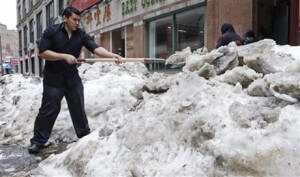BOSTON (AP) — Ignore anyone who tells you snow is free.
Every workday lost during New England’s winter has meant millions of dollars taken out of the regional economy.
IHS Global Insight, an economic analysis firm, estimates Massachusetts alone suffered roughly $1 billion in lost wages and profits, as storm after storm pummeled the region, delivering more than 8 feet of snow in roughly a month.
Retailers and restaurants were among the hardest hit, as customers held off on big purchases or chose to stay at home rather than enjoy a night on the town.
A survey released this week by Massachusetts business groups representing those and other industries reported sales dropped an average of 24 percent and payroll dropped about 7 percent among their small businesses members.
Car dealers and real estate agents complained the poorly timed storms — many of which hit on or around weekends — were disastrous to business. And with the exception of the region’s ski resorts, many hotels, transportation companies and other businesses in the travel and tourism trade say they’ve struggled too.
“January and February are always tough months for us because people just don’t want to travel,” said Christopher Crean, a vice president at Peter Pan, a Springfield-based long-distance bus company. “But when you add in all the snow and cold and highway closures, that just compounds the injury. It’s hard to make a profit.”
Manufacturers, meanwhile, report they’re just starting to catch up on nearly a month of lost productivity.
During the worst of the storms, assembly lines shut down, work orders were delayed or canceled outright and treacherous roads and iced-over rail lines hindered transport of finished products.
“Not only were we losing sales on the front end of the storms, now we’re paying a lot more on the back end to get product out,” said Michael Tamasi, CEO of AccuRounds, a Massachusetts maker of shafts, valves and other parts for medical, defense, aerospace and information technology companies. “We’ve been adding hours, stretching out the work day, working on Saturdays, whatever we need to do.”
Business leaders say the storms, if anything, laid bare the shortcomings of two critical pieces of the regional economy: Greater Boston’s road and transit systems.
“We still have congested streets and longer commutes and that’s meaning lost productivity,” said Timothy Murray, president of the Worcester Regional Chamber of Commerce. “The system has really been no match for Mother Nature.”
Economists expect the ripple effects of New England’s storms will be felt nationally, but it’s too early to say to what extent.
Doug Handler, chief North American economist at the Massachusetts-based IHS Global Insight, says the storms likely won’t have the economic punch of last year’s winter, when a polar vortex exposed large swaths of the country to subzero temperatures and snow. That weather phenomenon caused widespread economic disruptions. Estimates for its overall economic impact have been pegged at anywhere from $15 billion to $50 billion.
“This is much more localized and in a region that can handle it, to a degree,” Handler said, acknowledging that parts of the South and Mid-Atlantic also saw snow this week, albeit nothing on the scale of what New England has gotten this winter. “We’re prepared for it in New England, whereas last year, some regions just weren’t.”
Indeed, U.S. employers added 295,000 jobs in February, exceeding expectations, the Labor Department reported Friday. Within that data, Handler noted the number of workers in nonagricultural jobs that were unable to work because of inclement weather was roughly on par with February’s historical average.
Elsewhere, Autodata Corp reported U.S. car sales in February were up about 5.3 percent from January but still fell short of expected gains. Analysts predict lost sales should be made up as the weather warms; U.S. new car sales are still on track to hit their highest level in more than a decade.
Economists also expect many New England industries will recover most lost productivity.
The region’s population centers are now largely built around hospitals, universities and the financial, health care and IT sectors — industries that are somewhat resilient to weather-related shutdowns. Many employees can work from home or simply spend more time in the office catching up. But even among those high-skill industries, there are limits to what can be done to soften the blow of bad weather.
Many drugmakers, research labs and other large health care and biotech institutions maintained 24/7 operations through the storms, taking on overtime costs or covering hotel stays and other travel expenses that likely won’t be recouped, industry officials said.
“There’s certain research that you just can’t stop,” said Peter Abair, of the Massachusetts Biotechnology Council, which represents more than 650 biotechnology companies and academic institutions. “To stop a project midstream is very difficult. All your expenses go out the door. You have to start from scratch.”



